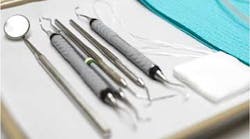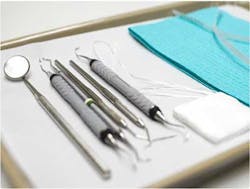Oral bacterium possibly associated with systemic disease found in Alabama schoolchildren
A noteworthy prevalence of a recently discovered serotype of oral bacterium, with a possible link to a number of systemic diseases, was found for the first time in a small cohort of African-American schoolchildren in a southwest Alabama town, according to research conducted by Stephanie Momeni, of the University of Alabama at Birmingham.ADDITIONAL READING |Thoughtful use of local delivery antimicrobial agents in periodontitis
Momeni presented her research, conducted in the laboratory of Noel Childers, DDS, Joseph F. Volker, endowed chair and chair of UAB’s Department of Pediatric Dentistry, at the American Society for Microbiology General Meeting in New Orleans on June 1. The National Institute of Dental and Craniofacial Research provided research funding for the project. Momeni is a Dental Academic Research Training predoctoral fellow in UAB’s School of Dentistry.Streptococcus mutans serotype k, first discovered in Japan in 2004, has been linked to a number of systemic diseases, including bacteremia, infective endocarditis, and hemorrhagic stroke. However, the bacteria evaluated in the present study were missing the proteins suggested to link S. mutans serotype k with these systemic diseases, says Momeni, a doctoral candidate in the UAB Department of Biology, which is housed in UAB’s College of Arts and Sciences.ADDITIONAL READING |Increasing dental case acceptance through the use of salivary diagnostics “S. mutans is associated with oral disease, but some serotypes have been reported to be more invasive and thus may also contribute to systemic disease,” Momeni said. “The S. mutans serotype k found in this study has undetermined significance since it lacks the previously identified invasive genes. Given the small sample size, results are considered preliminary.”S. mutans is frequently associated with the formation of cavities. There are four known serotypes (c, e, f, and k) that colonize humans, of which minor oral serotypes f and k are reported least often (less than 5% of the time). The purpose of this study was to determine the serotypes of 100 randomly selected S. mutans bacterial isolates and then determine whether these isolates possess two collagen-binding proteins, Cnm and Cbm, reportedly associated with systemic disease.ADDITIONAL READING |Chairside Salivary Diagnostics for Oral Diseases
Momeni presented her research, conducted in the laboratory of Noel Childers, DDS, Joseph F. Volker, endowed chair and chair of UAB’s Department of Pediatric Dentistry, at the American Society for Microbiology General Meeting in New Orleans on June 1. The National Institute of Dental and Craniofacial Research provided research funding for the project. Momeni is a Dental Academic Research Training predoctoral fellow in UAB’s School of Dentistry.Streptococcus mutans serotype k, first discovered in Japan in 2004, has been linked to a number of systemic diseases, including bacteremia, infective endocarditis, and hemorrhagic stroke. However, the bacteria evaluated in the present study were missing the proteins suggested to link S. mutans serotype k with these systemic diseases, says Momeni, a doctoral candidate in the UAB Department of Biology, which is housed in UAB’s College of Arts and Sciences.ADDITIONAL READING |Increasing dental case acceptance through the use of salivary diagnostics “S. mutans is associated with oral disease, but some serotypes have been reported to be more invasive and thus may also contribute to systemic disease,” Momeni said. “The S. mutans serotype k found in this study has undetermined significance since it lacks the previously identified invasive genes. Given the small sample size, results are considered preliminary.”S. mutans is frequently associated with the formation of cavities. There are four known serotypes (c, e, f, and k) that colonize humans, of which minor oral serotypes f and k are reported least often (less than 5% of the time). The purpose of this study was to determine the serotypes of 100 randomly selected S. mutans bacterial isolates and then determine whether these isolates possess two collagen-binding proteins, Cnm and Cbm, reportedly associated with systemic disease.ADDITIONAL READING |Chairside Salivary Diagnostics for Oral Diseases
Samples were collected from schoolchildren between the ages of 5 and 10 as part of an ongoing longitudinal epidemiological study of S. mutans. A total of 57 children were tested with primers specific to each serotype and collagen-binding proteins. The study found serotypes c (84%), e (3%), and k (11%), with no serotype f observed. Two samples were determined to be untypeable. ADDITIONAL READING |Does your dental extraction socket need a bone graft: A decision matrix Although the bacteria evaluated in this study were all missing the collagen-binding proteins suggested to link S. mutans serotype k and systemic disease, some scientists propose these genes may be acquired over time or that these organisms could have other unknown proteins possibly associated with systemic disease. Momeni says further study is needed to determine if the S. mutans serotype k strains found in this study have other invasive qualities associated with systemic diseases. Furthermore, she adds, the prevalence of serotype k reported in this study may be conservative since only individual bacterial isolates were tested. This number could be considerably higher when more oral isolates are analyzed from each individual. For more information about UAB, visit their website.

